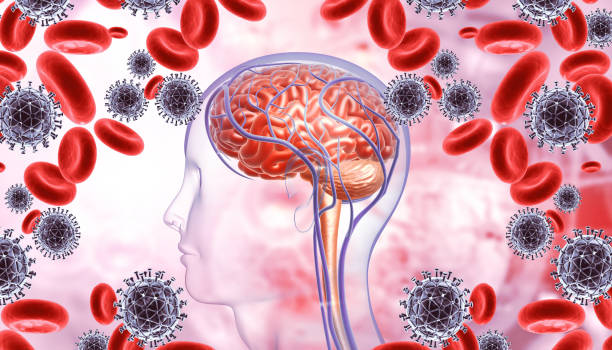
Human brain on virus background. 3d illustration
Cerebral Malaria
Cerebral malaria is a severe form of malaria that affects the brain. It is caused by the Plasmodium falciparum parasite, which is transmitted through the bite of an infected Anopheles mosquito. This condition is a medical emergency and requires immediate treatment to prevent severe complications or death.
Causes
- Plasmodium falciparum: The primary cause of cerebral malaria is infection with Plasmodium falciparum, the most dangerous of the malaria parasites.
- Mosquito Bites: Transmission occurs through the bite of an infected Anopheles mosquito, which injects the parasite into the bloodstream.
Risk Factors
- Geographic Location: Living in or traveling to areas where malaria is endemic, particularly sub-Saharan Africa and parts of Southeast Asia.
- Lack of Access to Healthcare: Limited access to timely diagnosis and treatment increases the risk of severe malaria.
- Weakened Immune System: Individuals with compromised immune systems, including young children and pregnant women, are at higher risk.
- No or Inadequate Use of Preventive Measures: Not using mosquito nets, insect repellents, or antimalarial prophylaxis increases the risk of infection.
- Previous Malaria Infection: Individuals who have had malaria before may be at higher risk for severe forms.
Symptoms
- Fever: High fever is a common symptom.
- Headache: Severe and persistent headache.
- Confusion or Delirium: Changes in consciousness, including confusion, agitation, or delirium.
- Seizures: Can occur due to the infection’s impact on the brain.
- Coma: In severe cases, patients may lose consciousness and enter a coma.
- Vomiting: Persistent vomiting may occur.
- Abnormal Behavior: Changes in mental status and behavior.
- Difficulty Breathing: Respiratory distress may be present.
Diagnosis
- Clinical Evaluation: A doctor will assess symptoms and medical history.
- Blood Tests: Rapid diagnostic tests (RDTs) and microscopic examination of blood samples to detect Plasmodium falciparum parasites.
- Imaging Studies: CT scans or MRIs of the brain may be used to assess brain damage or rule out other conditions.
- Lumbar Puncture: In some cases, cerebrospinal fluid (CSF) analysis may be performed to rule out other causes of altered mental status.
Treatment
- Intravenous Antimalarials: Artemisinin-based combination therapies (ACTs) such as artesunate are the preferred treatment for cerebral malaria. They are administered intravenously to ensure rapid and effective action.
- Supportive Care: Includes measures to manage symptoms and complications, such as anticonvulsants for seizures, and fluids to prevent dehydration.
- Antibiotics: May be used if secondary bacterial infections are suspected.
- Treatment of Complications: Management of complications such as respiratory distress, organ failure, or severe anemia.
Complications
- Neurological Damage: Permanent brain damage can occur, leading to cognitive and motor impairments.
- Seizures: Can be recurrent and severe.
- Coma: Prolonged coma can lead to additional complications and may affect long-term recovery.
- Organ Failure: Involvement of other organs, such as liver or kidneys.
- Death: If not treated promptly, cerebral malaria can be fatal.
Precautions
- Avoid Mosquito Bites: Use insect repellent, wear long-sleeved clothing, and sleep under mosquito nets.
- Prophylactic Medication: In malaria-endemic areas, take antimalarial medications as prescribed.
- Immediate Medical Attention: Seek prompt medical care if malaria is suspected.
Self-Care
- Monitor Symptoms: Keep track of symptoms and seek medical help if they worsen.
- Follow Treatment: Adhere strictly to prescribed treatment and follow-up appointments.
- Maintain Good Hygiene: Prevent secondary infections by practicing good hygiene.
Early diagnosis and treatment are crucial to managing cerebral malaria effectively and preventing serious complications. If you or someone else shows symptoms of cerebral malaria, seek medical attention immediately.








